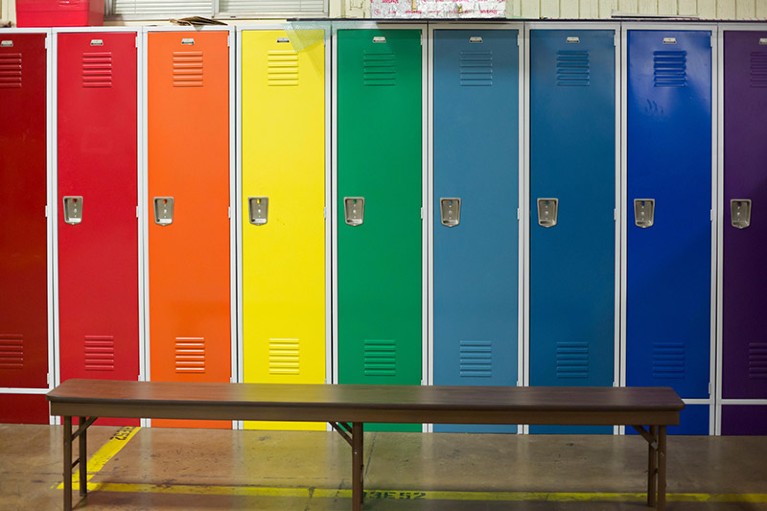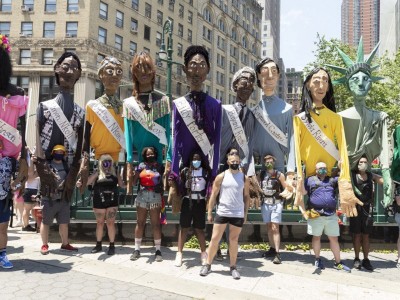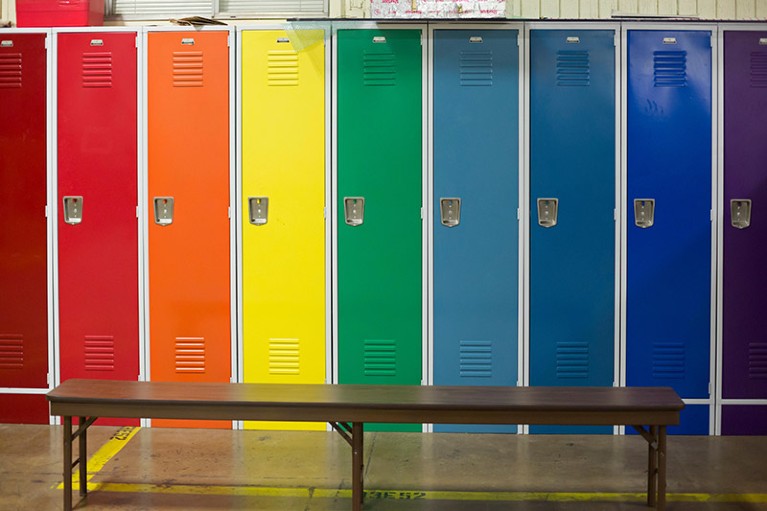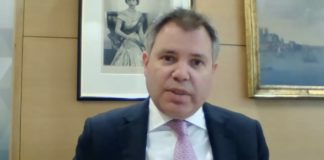
Lockers in a rainbow of colours at the US National Science Foundation Ice Core Facility in Lakewood, Colorado.Credit: Jim West/Alamy
The US National Science Foundation (NSF) has decided not to include a question about sexual orientation on one of its workforce surveys, setting off a social-media firestorm. More than 1,700 researchers have now signed an open letter urging the agency’s director to reconsider the decision. They argue that it is crucial to collect such information to understand the make-up of the scientific community and craft policies that lessen disparities for people from sexual and gender minorities.

How LGBT+ scientists would like to be included and welcomed in STEM workplaces
The National Center for Science and Engineering Statistics (NCSES), a subdivision of the NSF, regularly administers several surveys that provide key data about the US scientific workforce to policymakers and researchers on demographics such as sex, race and ethnicity, scientific discipline and citizenship status. The NCSES has for years been considering adding questions about sexual orientation and gender identity to its surveys, but delays have frustrated scientists.
In an application filed with the US Office of Management and Budget (OMB) on 14 December 2022, the NSF said that it would include a two-part question about gender identity, but not one about sexual orientation on its 2023 National Survey of College Graduates. Julia Milton, a spokesperson for NCSES in Alexandria, Virginia, said in a statement that data-quality and privacy issues led the agency to exclude the sexual-orientation question. The agency tested the questions during a pilot survey, and concluded that the sexual-orientation one led to more respondents quitting and not responding to the query than did other queries.
Jon Freeman, a neuroscientist at Columbia University in New York City who authored the open letter, has been pushing the NSF to include such questions for years. He is not convinced by the agency’s rationale to exclude the sexual-orientation question. The NSF “justified this move with flawed analyses, inappropriate benchmarks and selective reporting of its own pilot data”, Freeman writes in the letter. Milton did not answer Nature’s enquiries about the allegations in the letter.
“It’s perplexing they would leave the sexual-orientation question off, given that it’s been asked successfully for ten years now” on surveys by other federal agencies, says Nancy Bates, a former US Census Bureau statistician who co-chaired a 2022 National Academies of Science, Engineering and Medicine consensus report on measuring sex, gender identity and sexual orientation.
The ‘gold standard’
The decision comes as some studies have suggested that people who identify as lesbian, gay, bisexual, transgender or another sexual or gender minority (LGBT+) are under-represented in the sciences and face more barriers and workplace harassment than those who do not identify as such1,2.

‘I was no longer pretending or hiding’: a trans scientist finds a lab to call home
The NSF’s surveys are considered to be the “gold standard of data collection” on the scientific workforce, so this decision is highly consequential, Bates says. Although Milton says that NCSES’s surveys do not have “bearing on the determination of eligibility for federal research funding”, Emma Wojtowicz, a spokesperson for the US National Institutes of Health (NIH), notes that some agencies such as the NIH use data from the NSF’s workforce surveys to determine which groups are under-represented and therefore qualify for grants that promote diversity.
“If we don’t have the data to understand potential differences or disadvantages, the silence of the data itself reproduces inequality,” says Erin Cech, a sociologist at the University of Michigan in Ann Arbor who studies LGBT+ representation in science and who has signed the letter. In June 2022, US President Joe Biden issued an executive order directing federal agencies to “advance the responsible and effective collection” of gender-identity and sexual-orientation data.
Survey design concerns
To ensure that adding or revising questions on its surveys wouldn’t result in people quitting them or otherwise distorting the data collected, NCSES ran a pilot of its college-graduates survey in 2021 with 5,000 respondents. The survey included both a gender-identity and a sexual-orientation question. In its submission to the OMB, the NCSES said that it had concerns about how the sexual-orientation question performed.
To fix LGBTQ+ disparities in science, we need the data
But the agency tested a strange version of the sexual-orientation question, says Kerith Conron, research director at the Williams Institute in Los Angeles, California, a think tank that conducts research on sexual-orientation and gender-identity law and public policy. The question began with a phrase that Bates says might have confused people, and included more response options than are used in other federal surveys. “I’ve been around a long time, and I’ve never seen that question before,” Conron says. Milton replies that the expanded response options could “inform the broader federal government’s effort to measure and understand sexual minorities”.
Conron applauds the agency’s inclusion of a gender-identity question, but says that it was a “fail on the part of NSF not to include more traditional measures of sexual orientation”. In the open letter, Freeman calls on the agency to release the full data of the pilot study.
Whether or not the NSF will exclude the sexual-orientation question from its other scientific-workforce surveys is still unclear. Freeman says it would be unusual for the agency to exclude it from the college-graduates survey and then add it to other 2023 surveys.
Members of the public have until 14 January to submit comments about the NSF’s data-collection plans for the survey. The OMB will then have about 30 days to review the NCSES’s materials and all comments, after which it can either approve the plan or ask the NSF to revise it.








